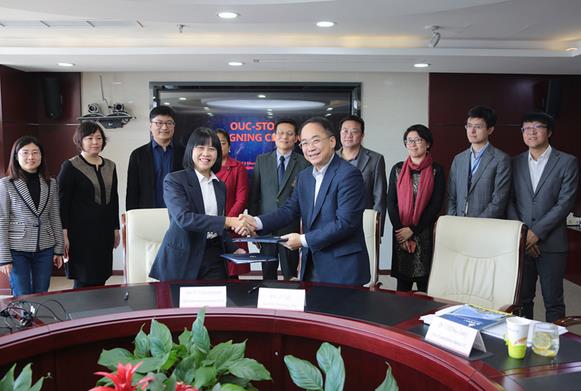 On 13 March, 2019, a delegation of three representatives of the Sukhothai Thammathirat Open University (STOU) of Thailand, led by Professor Krisana Rungrojwanich, STOU executive vice president, Professor Bhawat Chiamjinnawat, executive assistant, and Ms. Rattip Phukkeson, director of the International Affairs Department, visited the Open University of China (OUC). Yang Zhijian, OUC Party secretary and president, and OUC vice president Yang Xiaotang attended the reception.
On 13 March, 2019, a delegation of three representatives of the Sukhothai Thammathirat Open University (STOU) of Thailand, led by Professor Krisana Rungrojwanich, STOU executive vice president, Professor Bhawat Chiamjinnawat, executive assistant, and Ms. Rattip Phukkeson, director of the International Affairs Department, visited the Open University of China (OUC). Yang Zhijian, OUC Party secretary and president, and OUC vice president Yang Xiaotang attended the reception.

The delegation visited the Digital Learning Resources Centre and the Super Cloud Classroom, learning about the integration of digital resources into the learning environment and the design and operations of the cloud classroom, and evaluating the construction of those resources and the integration of information technology with teaching at the OUC.
The two sides also exchanged information about the operations of the two universities and discussed cooperation in academic research, curriculum development, scholarly exchanges, co-hosting of international conferences, joint construction of Chinese learning centres, and so on. Yang Zhijian signed a memorandum of cooperation with the STOU on behalf of the OUC.
STOU is one of the research objects of the "Case Studies on World Open Universities" series, a key research project of The OUC 13th Five-Year Plan, which will be completed by a team consisting of researchers from both the OUC and STOU. The delegation participated in a manuscript-writing seminar hosted by the OUC Education Research Institute, and Professor Krisana Rungrojwanich of the STOU research team expressed his support of and willingness to participate in the completion of the manuscript.
Thailand has a central location in ASEAN and is an important partner of China in the “Belt and Road” initiative. STOU, founded in 1978, is the eleventh national university in Thailand and the first university specialising in distance higher education in Thailand and Southeast Asia. At present, STOU has an estimated 100,000 active students, and offers degree programmes at the Bachelor, Master's and Doctoral levels, as well as non-degree programmes.
By Chen Na and Li Wei, OUC